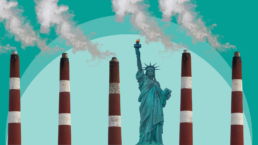After decades of failed climate bills, it’s worth asking: Why is the U.S. so bad at this?
By Shannon Osaka, Grist
A Democratic president was in the White House. The Democratic Party held a majority of seats in both the House of Representatives and the Senate. But a single senator — a moderate Democrat from West Virginia — blocked the White House’s preferred climate plan.
No, this wasn’t 2021 — the year was 1993: Jurassic Park had just been released, Bill Clinton was president, and atmospheric carbon dioxide was only 357 parts per million (it’s 415 ppm today). Senator Robert Byrd of fossil-fuel laden West Virginia was the chair of the Senate Appropriations committee, and without his support, the Clinton administration couldn’t pass a tax on carbon emissions to address climate change. The White House opted to support an energy tax instead, which passed the House but, faced with substantial opposition and fossil-fuel lobbying, never became law.

It was the first climate policy failure of many. Four years later, Byrd spearheaded a resolution that prevented the U.S. from ratifying the Kyoto Protocol, an international treaty to cut greenhouse gas emissions. Other efforts to pass climate legislation stalled nearly every year after. Indeed, the last three decades of U.S. climate policy look like a graveyard of failed bills: Carbon taxes have died on the Senate floor and been torched by attack ads. Cap-and-trade systems have been endorsed — and then abandoned — by Republicans and Democrats alike.
Recent Posts
“Arrest Now, Ask Questions Later”: Why Did L.A. ICE Agents Arrest and Jail U.S. Citizen Andrea Velez?
July 3, 2025
Take Action Now “They didn’t have vests that said ICE or anything. Their cars didn’t have license plates. … Just because of the color of our…
Trump’s Big, Beautiful Bill Is Naked Class War
July 3, 2025
Take Action Now Trump’s “Big, Beautiful Bill” trades tax cuts on millionaires for the dissolution of society.By Hamilton Nolan, In These Times…
Mayor Mamdani’s First Day, A Zero Hour Conversation With Richard Wolff
July 2, 2025
Take Action Now If elected, what would Mayor Mamdani do on his first day in City Hall? How would a democratic socialist govern as a big-city mayor?……
The U.S. Is Funding A Bloodbath At Gaza Aid Centers
July 2, 2025
Take Action Now The admin just gave $30M to GHF, the organization at the center of charges that Israel is weaponizing assistance and shooting at…




